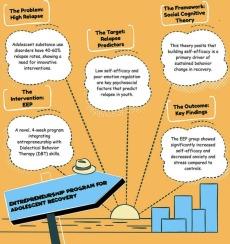The business of recovery: A novel pilot study psychosocial intervention to build self-efficacy and reduce relapse risk in adolescent substance use treatment
IF 3.6
2区 医学
Q1 PSYCHOLOGY, CLINICAL
引用次数: 0
Abstract
Introduction
Relapse rates following adolescent substance use disorder (SUD) treatment remain high, highlighting a need for innovative interventions that improve engagement and target key psychosocial mechanisms of recovery. Drawing on Social Cognitive Theory, this pilot study evaluated a novel, strength-based Entrepreneurial Education Program (EEP) designed to reduce relapse risk by increasing self-efficacy, positive affect, and emotion regulation.
Methods
Twenty-seven adolescent males (M age = 15.18) in residential SUD treatment were assigned to either the EEP intervention (n = 15) or a treatment-as-usual control group (n = 12). The EEP consisted of four weekly sessions integrating entrepreneurial skill-building with Dialectical Behavior Therapy (DBT) principles. Validated measures of self-efficacy, affect, emotion regulation, depression, anxiety, and stress were administered at baseline and post-intervention (4 weeks).
Results
Between-group analyses showed the EEP group had a significantly greater improvement in self-efficacy (p = 0.019) and greater reductions in anxiety (p < 0.001) and stress (p = 0.04) compared to the control group. Between-group differences for emotion regulation and positive affect were not statistically significant.
Conclusions
A brief, entrepreneurship-focused psychosocial intervention can effectively target critical antecedents of relapse in adolescents with SUD. By building self-efficacy and improving affect regulation in an engaging, non-traditional format, the EEP shows promise as an adjunctive therapy to enhance treatment outcomes. Future research should include larger, more diverse samples and long-term behavioral follow-up.

康复的业务:一项新的试点研究心理社会干预,以建立自我效能感和减少青少年药物使用治疗的复发风险
青少年物质使用障碍(SUD)治疗后的复发率仍然很高,这突出表明需要创新干预措施,以提高参与度并针对关键的康复心理社会机制。利用社会认知理论,本试点研究评估了一种新颖的、基于力量的创业教育计划(EEP),该计划旨在通过提高自我效能、积极影响和情绪调节来降低复发风险。方法将27例接受SUD住院治疗的青少年男性(M年龄= 15.18岁)分为EEP干预组(n = 15)和正常治疗对照组(n = 12)。EEP包括四个星期的会议,整合创业技能建设和辩证行为疗法(DBT)原则。在基线和干预后(4周)进行自我效能、情感、情绪调节、抑郁、焦虑和压力的有效测量。结果组间分析显示,与对照组相比,EEP组在自我效能感(p = 0.019)、焦虑(p < 0.001)和压力(p = 0.04)方面的改善显著高于对照组。情绪调节和积极情绪组间差异无统计学意义。结论简言之,以创业精神为中心的心理社会干预可以有效地针对青少年SUD复发的关键前因。通过建立自我效能感,并以一种引人入胜的、非传统的方式改善情绪调节,EEP有望作为一种辅助疗法来提高治疗效果。未来的研究应该包括更大、更多样化的样本和长期的行为随访。
本文章由计算机程序翻译,如有差异,请以英文原文为准。
求助全文
约1分钟内获得全文
求助全文
来源期刊

Addictive behaviors
医学-药物滥用
CiteScore
8.40
自引率
4.50%
发文量
283
审稿时长
46 days
期刊介绍:
Addictive Behaviors is an international peer-reviewed journal publishing high quality human research on addictive behaviors and disorders since 1975. The journal accepts submissions of full-length papers and short communications on substance-related addictions such as the abuse of alcohol, drugs and nicotine, and behavioral addictions involving gambling and technology. We primarily publish behavioral and psychosocial research but our articles span the fields of psychology, sociology, psychiatry, epidemiology, social policy, medicine, pharmacology and neuroscience. While theoretical orientations are diverse, the emphasis of the journal is primarily empirical. That is, sound experimental design combined with valid, reliable assessment and evaluation procedures are a requisite for acceptance. However, innovative and empirically oriented case studies that might encourage new lines of inquiry are accepted as well. Studies that clearly contribute to current knowledge of etiology, prevention, social policy or treatment are given priority. Scholarly commentaries on topical issues, systematic reviews, and mini reviews are encouraged. We especially welcome multimedia papers that incorporate video or audio components to better display methodology or findings.
Studies can also be submitted to Addictive Behaviors? companion title, the open access journal Addictive Behaviors Reports, which has a particular interest in ''non-traditional'', innovative and empirically-oriented research such as negative/null data papers, replication studies, case reports on novel treatments, and cross-cultural research.
 求助内容:
求助内容: 应助结果提醒方式:
应助结果提醒方式:


